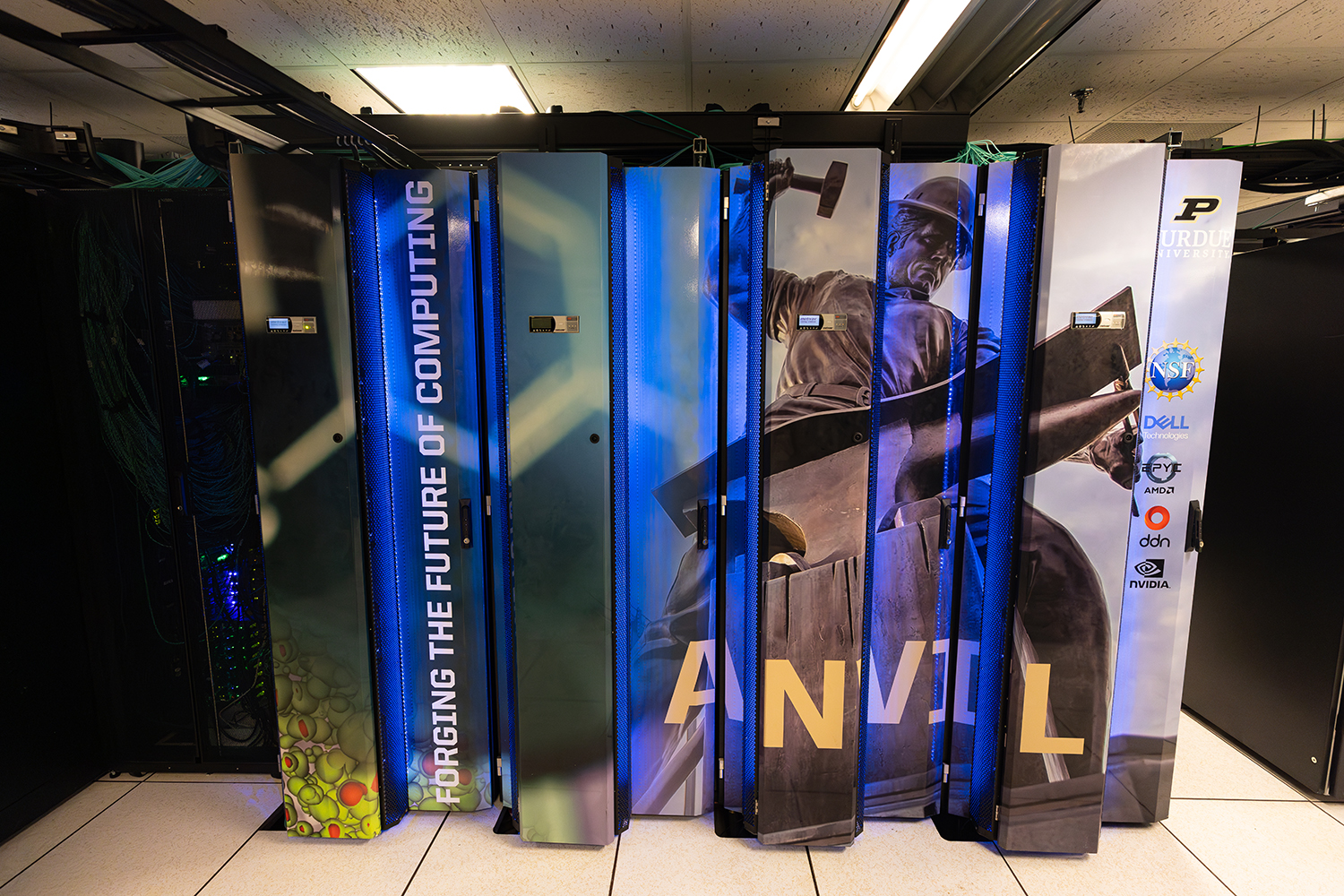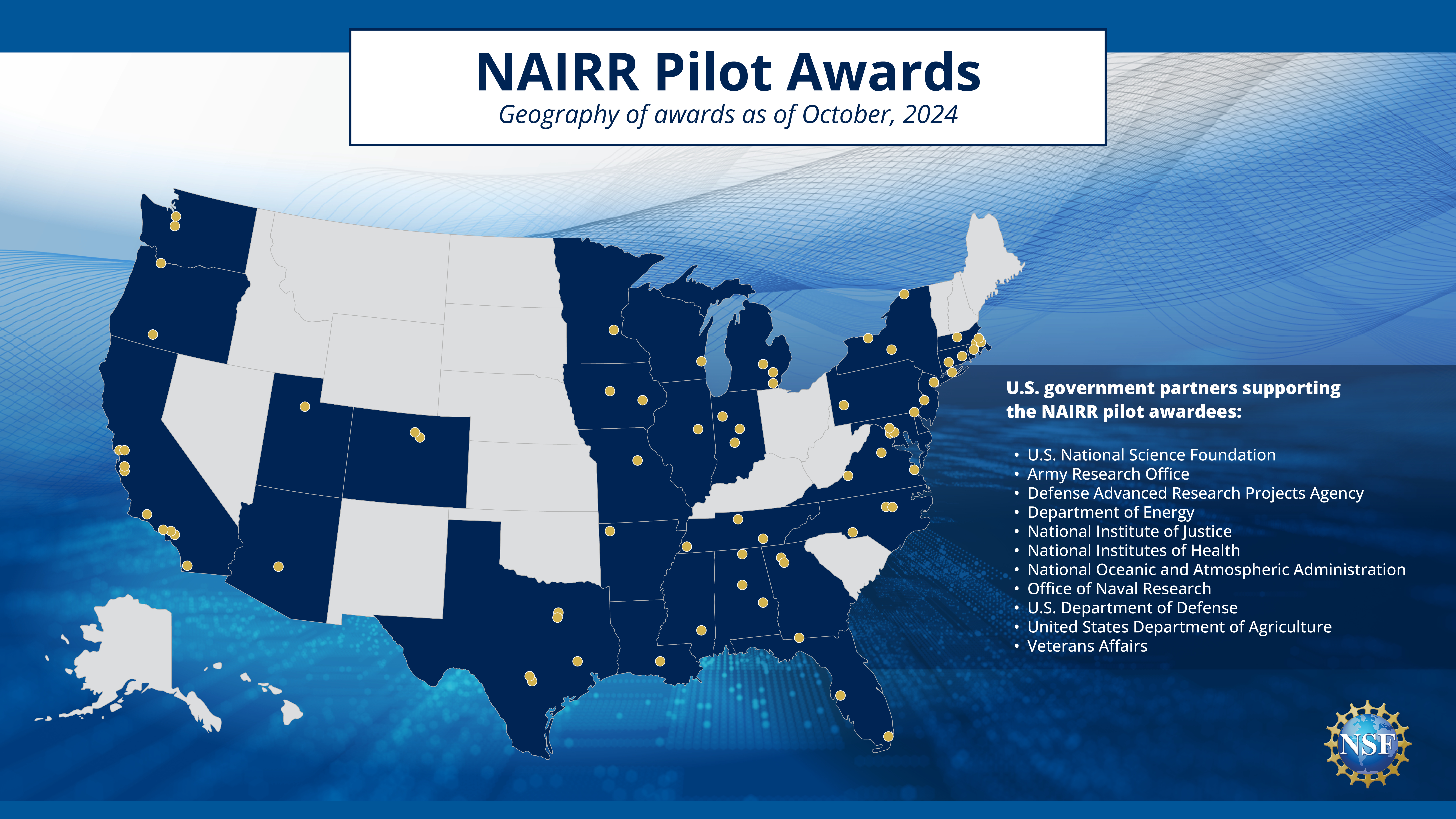NAIRR Pilot proves to be successful in delivering resources to AI researchers
Earlier this year,  the National Science Foundation (NSF) launched the National Artificial Intelligence Research Resource (NAIRR) Pilot to demonstrate the NAIRR concept and advance its primary goals of spurring innovation, increasing diversity of talent, improving capacity, and advancing safe, secure, and trustworthy artificial intelligence (AI) in research and society. Anvil, Purdue University’s most powerful supercomputer, became an official resource provider for the NAIRR Pilot, and has hit the road running, having already taken on three separate NAIRR research projects.
the National Science Foundation (NSF) launched the National Artificial Intelligence Research Resource (NAIRR) Pilot to demonstrate the NAIRR concept and advance its primary goals of spurring innovation, increasing diversity of talent, improving capacity, and advancing safe, secure, and trustworthy artificial intelligence (AI) in research and society. Anvil, Purdue University’s most powerful supercomputer, became an official resource provider for the NAIRR Pilot, and has hit the road running, having already taken on three separate NAIRR research projects.
The concept for the NAIRR originated with a letter to the research community highlighting the urgent need for a national AI research infrastructure that would ensure U.S. researchers and educators have access to the computational and data resources necessary to drive AI innovation. The sentiment was clear—AI is impacting every facet of life, and in order to harness its full potential, we need to pursue the talent and knowledge that exists in every corner of the nation to perform research, development, and implementation. The NAIRR Pilot initiative is laying the foundation for an AI research ecosystem where ideas and innovations from a diverse pool of talent can thrive and benefit all Americans.
“The need for AI infrastructure, research, and education is only going to increase,” says NSF Director Sethuraman Panchanathan. “In providing access to top-tier AI resources and expertise, the government, industry, and non-profit partners of the NAIRR pilot are helping our nation’s researchers and educators develop AI for the greater good and train our rapidly expanding AI workforce. NAIRR is meeting people where they are, regardless of geography or background, channeling the United States’ unique diversity into innovations and discoveries to advance a trustworthy global AI ecosystem and drive international standards, ensuring U.S. AI leadership for decades to come.”
The Anvil team has been hard at work supporting the new NAIRR Pilot research projects and is thrilled by how smoothly everything is going. And thanks to the impending system upgrades funded by the NSF, Anvil will soon be able to provide even more resources to AI researchers throughout the nation. New Nvidia H100 GPUs are currently being integrated into the system, significantly expanding Anvil’s capacity for AI research. The team has also been focusing on how to quickly and efficiently get NAIRR researchers onto Anvil.
"We have been streamlining our processes for on-boarding these new NAIRR projects and users on Anvil,” says Rajesh Kalyanam, Senior Research Scientist at RCAC and co-PI on the Anvil project. “Once these users have been provided access to Anvil, our support team reaches out to offer an in-depth technical consultation meeting so that they can use these resources efficiently. Two such meetings have already been conducted, which the researchers found to be very useful."
Thus far, three NAIRR projects have been undertaken on Anvil. The projects are:
- “Quantification of Mask Efficacy in Large Population.” Kourosh Shoele (PI), Florida State University
- “TEA: Two-Player LLM Games with an LLM Referee.” Manolis Zampetakis (PI), Yale University
- “Scaling Resilient and Adaptable Decentralized Learning to Large Dynamic Networks.” David Inoyue (PI), Purdue University
Anvil has also seen the addition of a new, secure LLM dedicated to researchers, AnvilGPT. More information about this new AI tool can be found in our AnvilGPT News Release.
Nationwide, the NAIRR Pilot is seeing tremendous interest. The pilot launched with a diverse suite of awardees and partners—including 13 federal agencies, 26 private institutions, and nearly every leading tech company—in order to ensure that AI is developed with input from every sector in society. Three major tasks that the NAIRR Pilot is undertaking are:
- Delivering access to AI resources
- Broadening the AI workforce
- Enhancing infrastructure to support AI research
The NAIRR pilot is demonstrating what could be unleashed across the nation by a fully implemented NAIRR, helping to define the effort and rapidly expand the partnerships needed to unlock the full potential of AI for U.S. researchers, educators, and society, and ensure American leadership in the safe, secure, and trustworthy development of AI.
"In its full form, NAIRR will provide a future where AI computing and data resources are accessible to communities across the country, driving innovation and unleashing the ingenuity of the research Community,” says Katie Antypas, director of the NSF Office of Advanced Cyberinfrastructure. "It will enable our nation’s researchers to tackle key societal challenges, from extreme weather events to cancer treatments, food insecurity and poverty. The full NAIRR will catalyze economic growth and responsible AI development, and plant the seeds of discovery for decades to come."

To learn more about the NAIRR Pilot, specific research projects, and current opportunities, please visit: https://nairrpilot.org/.
Anvil is Purdue University’s most powerful supercomputer, providing researchers from diverse backgrounds with advanced computing capabilities. Built through funding from the National Science Foundation (NSF), Anvil supports scientific discovery by providing resources through the NSF’s Advanced Cyberinfrastructure Coordination Ecosystem: Services & Support (ACCESS), a program that serves tens of thousands of researchers across the United States.
Researchers may request access to Anvil via the ACCESS allocations process. More information about Anvil is available on Purdue’s Anvil website. Anyone with questions should contact anvil@purdue.edu. Anvil is funded under NSF award No. 2005632.
Written by: Jonathan Poole, poole43@purdue.edu
